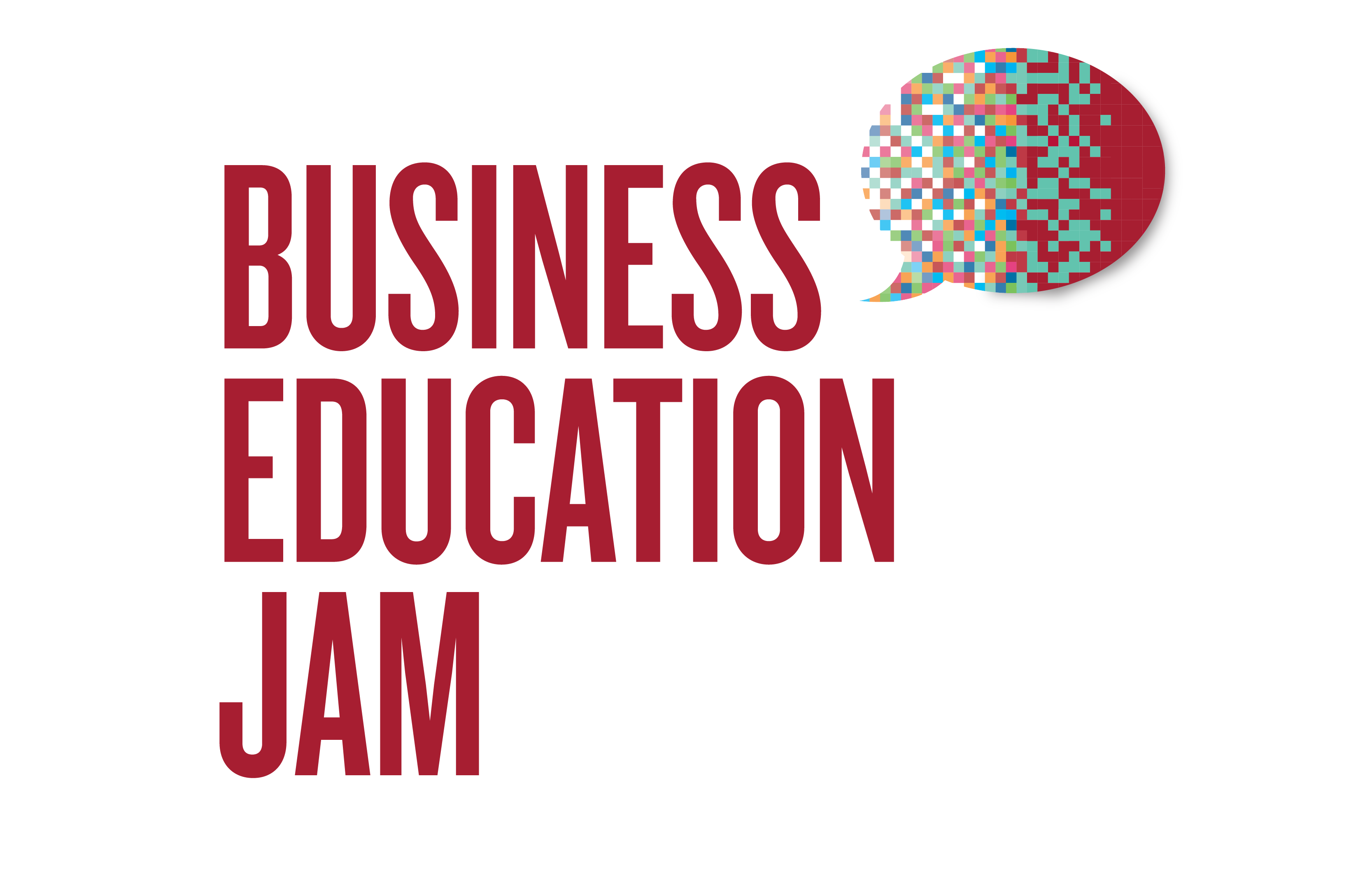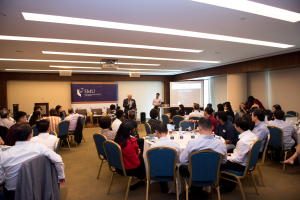Southeast Asia Jam: August 2018
Held in collaboration with

The Southeast Asia Jam was the fourth event in this series of regionally focused dialogues on business education and was hosted in collaboration with the Lee Kong Chian School of Business at Singapore Management University.
Overview
There have been significant criticisms of business schools in recent years for failing to provide useful skills, clear purpose and not encouraging ethical behaviour. Several academics have even challenged the conventional view of education to suggest that many schools may be disrupted by the confluence of globalization and innovation. Others have gone so far to suggest that students do not gain a mastery of knowledge in business schools, raising more questions about the value of business education and impact on society. In the context of Asia, the rapid rise to prominence of business schools has been staggering in a somewhat stable industry. With the emerging economies fueling this growth coupled with the scale and demographics of 3 billion people across Asia-Pacific, the business schools in region have enjoyed growth in revenue, rankings and recognition. Most of the acknowledged success in Asian business schools stems from leveraging traditional models of management education imported from the West, namely the US or UK. However, these traditional models may not account for the new digital modes of learning, the unique cultures of Asia, the ageing populations based on demographics of the region, and expectations of society for sustainable orientation for the future.
Topics discussed at the Southeast Asia Jam included:
- How might Business Schools leverage on the new Digital Mode of Learning?
- How might Business Schools foster greater Diversity and Inclusion?
- How might Business Schools include Entrepreneurship into the curriculum?
- How might Business Schools create Lifelong Learning?
- How might Business Schools make an Impact on Society?
Key Themes
The Southeast Asia Jam, held at Singapore Management University. brought together regional leaders, business school academics, students, alumni, and staff to explore key questions about the industry. The business education jam session in Singapore might be criticized as trying to “Think outside the box from within the box” as the nation is known for the pragmatic orientation and risk adverse culture. However, the Jam team created a “Safe to Challenge” environment for the participants around several themes that emerged in the run-up to the jam event.
The five themes which emerged from this dialogue included:
- Leveraging Digital for new Modes of Learning As with almost any other industry, teaching and learning is being transformed by technology: From conducting one’s research using online resources instead of spending hours in a library, to virtually engaging with other students and industry players located outside of campus, or even halfway across the world, it is indisputable that technological tools are essential for elevating the education experience. Despite the increasing number of people having the mind-set that business skills can be learned on the job, the business school programmes provide students with much-needed theoretical knowledge that cannot be replaced by a stint in a company where superiors are too busy with deadlines and bottom lines to offer in-depth training. Business education helps students develop in-depth analytical thinking that may not come on the job, or from simple learning online. Convergence of classroom-based learning, on-line learning, and the business school as a hub for networking and collaboration seems to be the mid-term vision for Asia. An integration of both classroom and digital modes of learning will help a student gain essential skills. The classroom environment is important because it encourages people to voice their opinions. The on-line tools and resources can provide key targeted skills and information at just the right time and place.
- Fostering Diversity and Inclusion There’s no doubt that diversity is something we need in every workplace, school, and organization, especially in a globalized world where the lines of ethnicity and citizenship are increasingly blurred. Its benefits are easy to see: it helps us appreciate different people of different cultures and encourages creativity when people of different backgrounds collaborate as a team. Many schools have achieved significant progress with gender diversity. However, leaders in Singapore want to do more in achieving greater diversity that represents all of Asia, which is a tough challenge. Costs and manpower aren’t the only obstacles on the path towards achieving diversity in a business school. Other constraints include varying national policies across countries and a difficulty in establishing an ideal percentage for student composition at different levels. The consensus was that a perfect balance of diversity is difficult to achieve, but it is still crucial to work towards the fair representation of all individuals. There is a strong commitment and clear understanding of diversity, yet certain challenges based on the regional context. Most organizations in Asia have more to do when it comes to creating an inclusive culture and seem committed to finding new ways to provide access to education to more people in the region.
- Creating an Environment for Entrepreneurship Businesses come in all shapes and sizes, as do entrepreneurs. And universities can play a part in not just grooming the next Jack Ma, but developing entrepreneurial attributes that can add value in any career track, not just running one’s own business. The culture in Asia is not always so forgiving for taking risks. Providing a safe environment for allowing experiments, trials, even failure could be a strong value proposition for business schools. However, the need for assessment, grades, and learning will need to change to allow more freedom for risk-taking. Ultimately, only a small percentage of students will go on to become entrepreneurs. Having an entrepreneurial mindset is essential for any kind of progress because one uses the same tools to start a business to relook ways of doing things in a corporate environment. Business schools in Asia could do a lot more to develop entrepreneurial skills and create more of a networked community between ideas, capital, business leaders, and research across borders in the region.
- Addressing the Need for Lifelong Learning The constant flux in the real world requires employees to learn, unlearn, and relearn repeatedly at a fast pace to remain relevant to the ever-evolving work force. The chase for traditional paper qualifications will continue during this journey of lifelong learning, as there remains a tendency to view certifications as a recognition of a one’s abilities. Students who progress further up the education ladder tend to be better rewarded, which is why there is an entrenched belief in attaining a degree early in life as a key to success. This sustained demand for traditional degrees also discourages schools from changing their current models to one that promotes lifelong learning. Business schools may consider ways to “hybridise” formal learning and on-the-job learning, whereby students can tie in real-world experiences with classroom discussions. Overtime, additional programmes for alumni and older workers to “refresh” their learning seemed to resonate with the demographic realities in the context of Singapore.
- Developing a Clear and Sustainable Impact for Society Whether it’s through the practice of free trade, support of local products, or social innovation, businesses today are taking small steps towards making a positive impact on the community. But what more can enterprises do to make a difference in the world, and address social needs in a tumultuous political and economic climate? And what role does the business school play in steering students towards such lofty goals? Focusing attention on what is good for the local and global society is a noble cause that few would challenge in the ranks of business school leadership, but we must also remember that the business school is also a business. Universities may get caught up in the “ranking race” and focus simply on the metrics that determine their future success in order to attract future students. This could be a potential distraction from more important issues like addressing the needs of society. If there is university pressure to squeeze more from business schools, we may find the schools becoming myopic and ambivalent to the positive impact they could have on society. Business schools must lead the way when it comes to societal impact and sustainability. Business schools can help link leaders in business who have a strong orientation to society with students. By creating programmes and curriculum that highlight the role of business and society as connected parts of one system, we will create future business leaders with an orientation towards a sustainable future.







